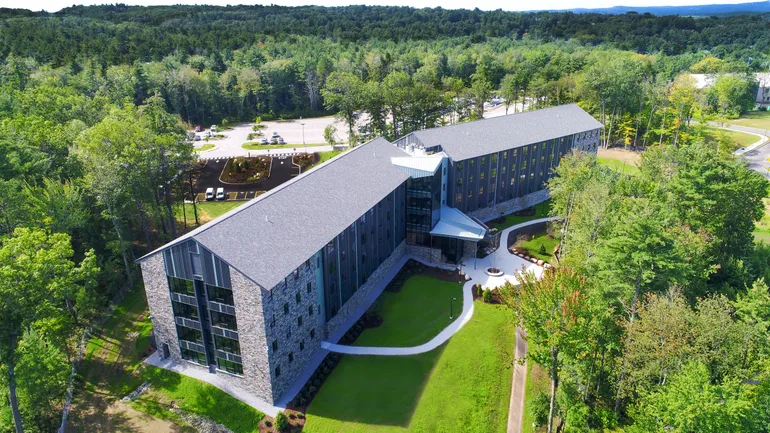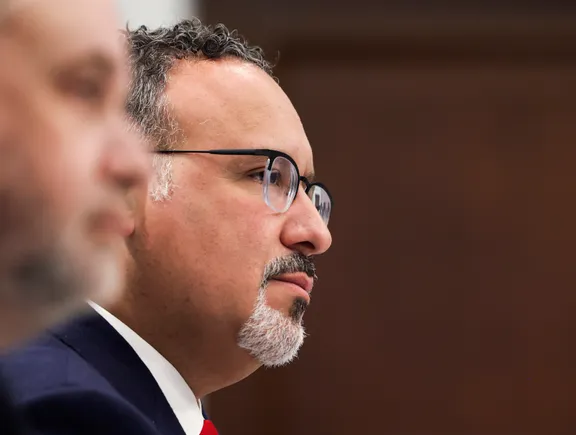In spite of Paul LeBlanc’s transformative role in reshaping Southern New Hampshire University into one of the country’s thriving hybrid “mega-universities,” students might not notice any big changes when he steps down at the end of June.
LeBlanc, who has led Southern New Hampshire as president for 20 years, built a small, sleepy campus of 2,500 students into an online giant serving more than 200,000 students. Upon leaving, he will hand the reins to Lisa Marsh Ryerson, who is currently provost.
Since joining Southern New Hampshire’s administration two years ago, Ryerson has overseen the school’s academic offerings and strategy. Last December, LeBlanc told the podcast “Reimagining the Future of Higher Education” that he was turning over many of his duties to Ryerson, as he turned his attention to the role of AI in higher ed and the workforce. LeBlanc will begin a year-long sabbatical on July 1, still employed by Southern New Hampshire University, to work with a team to study these issues.
“I’m really, really fortunate to be able to make the transition to the presidency over a long period of time, with a deep, enduring relationship with the current president,” Ryerson said.
She and LeBlanc have substantial overlap time, she said, and she is spending these months digging deep with the long-time president about the academic culture he has built over two decades.
Ryerson also plans to draw on her own experience as a leader in the higher education and philanthropy sectors when she takes the helm.
“With Lisa we get the best of both worlds,” LeBlanc said, “a proven leader with a great track record and someone who knows SNHU inside and out.”
Who Is Lisa Marsh Ryerson?
Ryerson’s career in higher ed administration goes back to 1995, when she assumed the role of president of Wells College in Aurora, New York. Just last month, Wells College announced that it was closing permanently after the Class of 2024 commencement.
She led Wells for 18 years, at times navigating the college through financial troubles. Ultimately, she steered the college through the difficult decision in 2004 to accept men.
“She tried to keep Wells a women’s college,” said Meredith VanDuyne, who worked as Ryerson’s assistant at Wells. “The reality of the marketplace took hold and she slowly began to consider broader strategies, including coeducation, that had helped so many other colleges.”
Ryerson’s approach during that period is typical of her leadership style, said VanDuyne, who is now assistant head of school for institutional advancement at the Flint Hill School, a private K-12 school in Virginia.
In making the decision to accept men at Wells, VanDuyne said, Ryerson was acting as “steward of an institution cared for by so many” and a major player in the economy of Aurora.
“She was fiercely determined to chart a course forward,” VanDuyne said.
Still, Ryerson took heat for opening the college to men.
Students protested prior to, during and after the decision, VanDuyne recalled. Some students even filed a lawsuit — eventually dropped — alleging breach of contract. After a painful transition, however, the decision bore fruit: Enrollment increased to 550 students in 2007, its largest headcount in decades.
A Wells alumna herself, Ryerson graduated in 1981 with a bachelor’s degree in English and then earned a master’s degree in education and literacy from the State University of New York at Cortland.
In 1984, she took a job in the Wells College admissions office and was promoted to dean of students in 1991. Three years later she became vice president of the college. In 1995, without a formal search, she was appointed college president.
“She knew how much the college needed consistent leadership, and she was singularly devoted to Wells,” said VanDuyne, who is also an alumna of the college.
In 2013, Ryerson left Wells, and higher ed, to serve as president of the AARP Foundation, the charitable affiliate of AARP.
During the pandemic lockdown, when public attention focused on the mental health risks of social isolation, Ryerson spoke and published about the increased dangers of loneliness for older adults. She launched initiatives to combat senior isolation, including Connect2Affect, which links seniors with volunteer and health organizations.
“Lisa demonstrated an infectious passion for improving the lives of others that inspired Foundation staff to do their best work,” said AARP CEO Jo Ann Jenkins.
Ryerson’s plans for Southern New Hampshire
Ryerson sees a connection between the work she did at AARP and her role at Southern New Hampshire. At AARP she helped create initiatives to address income, housing and hunger issues experienced by seniors. Students, she said, also struggle with some of these issues.
“We know that our learners, and our people who work here, need access to all the supports that promote robust well-being,” she said. Coming to understand the needs of older adults informed how she “thinks about the importance of connection,” she said.
Southern New Hampshire prides itself on supporting students who might otherwise feel shut out of higher education. Students can choose to enroll in either online or in-person courses taught both traditionally and using competency-based education, where they can skip parts of a course if they demonstrate mastery of the material.
The university touts this approach as a more inexpensive college experience than the traditional one. For the many adults with some college but no degree, programs like this are attractive.
Southern New Hampshire also offers a tailored approach to student advising, Ryerson said. Advisors follow students through their time at Southern New Hampshire to help identify their academic goals and connect them with needed supports so they can complete their degrees.
“That’s what real equity is,” she said. “You open up accessibility for education, but it’s the attainment that’s so important.”
As president, Ryerson said she will continue to build out initiatives she began as provost.
One will standardize the credits associated with Southern New Hampshire courses, eventually assigning credits for proven competencies instead of time for all courses. This new “one competency, one credit” framework, Ryerson said, will make it easier for students to get credit for prior learning — even in courses that are not in the competency-based education catalog.
She said she’ll also continue to prioritize workforce development initiatives.
Southern New Hampshire students, she said, may not all be physically located on the campus in northern Manchester, but they all live, learn and work in places they care about. It’s likely that they’re in college to get better jobs in the communities where they live.
That, Ryerson said, means that Southern New Hampshire needs to know what types of jobs are going to be available in those locales.
“Our learners have places that are important to them,” she said, “and they have to be important to us, in colleges and universities, too.”
She said she’ll continue to partner with advisory councils that help the school stay on top of employment trends, including the role of AI in both learning and careers. When building out courses, majors and programs, she said, the school will include skills and competencies that align with available jobs.
“We want our learners to be very clear about what they’ll be able to do with their learning,” she said.
#Real #equity #Southern #Hampshire #president #shares #vision










